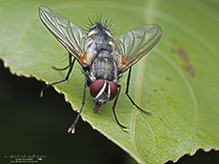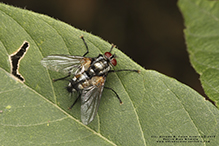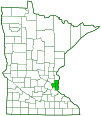tachinid fly
(Thelaira americana)
Conservation • Description • Habitat • Ecology • Distribution • Taxonomy
Conservation Status |
|
|||||||
| IUCN Red List | not listed |
|||||||
| NatureServe | not listed |
|||||||
| Minnesota | not listed |
|||||||
Description |
||
Thelaira americana is medium-sized tachinid fly. It occurs throughout the United States, in southern Canada, and in Mexico. It is uncommon in Minnesota. Larvae parasitize caterpillars of Virginia tiger moth and salt marsh moth. Adults are 5⁄16″ to ⅜″ (8 to 10 mm) in length. There are two large compound eyes at the side of the head and three small simple eyes (ocelli) in a triangle at the top of the head. The compound eyes are brown and bare, not covered with hairs. They do not meet at the top of the head in either sex. The antennae have three segments. The second segment has a longitudinal groove (suture) on top. The third segment has a long, forward-pointing bristle (arista) on the upper side. The arista is feather-like (plumose). The upper face (frons), corresponding to the forehead, is black. The area between the frons and the compound eye (frontorbital plate) is white. On each side of the face below the antenna there is a sunken area (parafacial) defined by the inner margin of the compound eye on the outside and an inverted V-shaped groove (ptilinal suture) on the inside. The parafacial is bare, at least on the lower half. There are long sensory organs (palps) attached to the mouth. The protruding mouthpart (proboscis) is short and fleshy. The thorax has three segments. Each segment has four principal exoskeletal plates, one above, one below, and one on each side. The upper (dorsal) plates, from front to rear, are the prescutum, scutum, and scutellum. The prescutum and scutum are shiny and black, with broad, powdery white (pruinose), lateral margins, and sometimes a narrow pruinose rear margin. There is a distinct groove (transverse suture) across the thorax separating the prescutum and scutum. The scutellum is black, shiny, and has three pairs of marginal bristles. On the underside, the plate on the second thoracic segment (katepisternum) has two or more bristles. The abdomen has at least one pair of long bristles on each segment. On the male, the first and second segment and the front half of the third segment are orange with a broad black stripe on the upper side and a narrow black stripe on the underside. Segment three also has some white on the upper side bordering part of the orange area. The rear half of the third segment and the entire fourth segment are black. The abdomen on the female is entirely black. The wings are mostly clear but with dark veins and a light, smoky-brown tint near the base. At the base of each wing there are two large rounded lobes (calypters) that cover the balancing organs (halteres). The first posterior cell (R5) is narrowed but open at the wing tip. The legs are long and black. |
||
Size |
||
Total length: 5⁄16″ to ⅜″ (8 to 10 mm) |
||
Similar Species |
||
Habitat |
||
Grasslands |
||
Ecology |
||
Season |
||
June to August |
||
Behavior |
||
The wings are held out at an angle when at rest, not almost parallel to the body. |
||
Life Cycle |
||
|
||
Larva Food |
||
Caterpillars of Virginia tiger moth and salt marsh moth |
||
Adult Food |
||
|
||
Distribution |
||||
|
Sources |
|||
| 9/10/2023 | ||||
Occurrence |
||||
|
||||
Taxonomy |
|||
Order |
Diptera (Flies) | ||
Suborder |
Brachycera | ||
Infraorder |
Cyclorrhapha | ||
| Zoosection | Schizophora | ||
| Zoosubsection | Calyptratae (Calyptrate Flies) | ||
Superfamily |
Oestroidea (Bot Flies, Blow Flies, and Allies) | ||
Family |
Tachinidae (Tachinid Flies) | ||
Subfamily |
Dexiinae | ||
Tribe |
Voriini | ||
Genus |
Thelaira | ||
The genus Thelaira was formerly placed in the tribe Thelairini in the subfamily Larvaevorinae. In 1960 Thelaira and three other genera were moved to the new tribe Voriini in the new subfamily Dexiinae. Some sources retain the older name for the tribe but accept the placement in the new family. |
|||
Synonyms |
|||
|
|||
Common Names |
|||
This species has no common name. The common name for the family Tachinidae is tachinid flies, and it is applied here for convenience. |
|||
Glossary
Arista
A large bristle on the upper side of the third segment of the antenna of a fly. Plural: aristae.
Calypter
On flies: one of two small membranous lobes at the base of the forewing that covers the haltere.
Frons
The upper front part of an insect’s face, roughly corresponding to the forehead.
Halteres
In flies: a pair of knob-like structures on the thorax representing hind wings that are used for balance.
Ocellus
Simple eye; an eye with a single lens. Plural: ocelli.
Palp
Short for pedipalp. A segmented, finger-like process of an arthropod; one is attached to each maxilla and two are attached to the labium. They function as sense organs in spiders and insects, and as weapons in scorpions. Plural: palpi or palps.
Proboscis
The tube-like protruding mouthpart(s) of a sucking insect.
Scutellum
The exoskeletal plate covering the rearward (posterior) part of the middle segment of the thorax in some insects. In Coleoptera, Hemiptera, and Homoptera, the dorsal, often triangular plate behind the pronotum and between the bases of the front wings. In Diptera, the exoskeletal plate between the abdomen and the thorax.
Scutum
The forward (anterior) portion of the middle segment of the thorax (mesonotum) in insects and some arachnids.
Visitor Photos |
|||||
Share your photo of this insect. |
|||||
| This button not working for you? Simply email us at info@MinnesotaSeasons.com. Attach one or more photos and, if you like, a caption. |
|||||
Alfredo Colon |
|||||
 |
 |
||||
MinnesotaSeasons.com Photos |
|||||
|
|||||

Slideshows |
||

Visitor Videos |
|||
Share your video of this insect. |
|||
| This button not working for you? Simply email us at info@MinnesotaSeasons.com. Attach a video, a YouTube link, or a cloud storage link. |
|||
Other Videos |
|||

Created: 1/3/2021
Last Updated:


